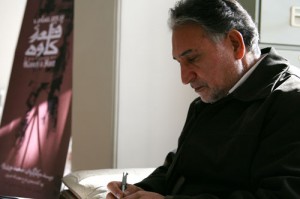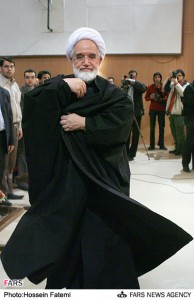Iran Document: Detained Nourizad's Letter to Khamenei "We Have Lost Our People"
 Thursday, April 22, 2010 at 11:14
Thursday, April 22, 2010 at 11:14  Pedestrian offers both the introduction to and the translation of Mohammad Nourizad's letter to the Supreme Leader....
Pedestrian offers both the introduction to and the translation of Mohammad Nourizad's letter to the Supreme Leader....Mohammad Nourizad is a writer, producer and journalist. He began his work for the state broadcaster IRIB with the late Morteza Avini’s Revayateh Fath [Tales of Resistance] – a documentary series on the Iran-Iraq war.
Prior to the election, he wrote for the hardline newspaper Kayhan, but what made him a household name was his support of the opposition after the election, and his letters to the supreme leader for which he is now serving time in prison.
He’s now written a fourth letter to the leader while in Evin Prison:
Iran Document: Ayatollah Sane’i “Some Want Islam For Their Own Agendas”
The Latest from Iran (22 April): This Isn’t Over
It’s been nearly four months now that I have been in prison for writing your eminence a letter. I have spent 68 days in solitary confinement. I have been insulted and beaten by my interrogators. In all of this, I have continued to speak of you as an intelligent, wise leader and I still believe that if change is to be brought to the country, this change will only be doable and sustainable if it comes from you. Personally, I have no hope in other bodies and individuals within the establishment. I know you closely. I know of your great soul. You in turn know me quite well.
While in prison, I have been unaware of what has been going on in the outside world. But in a brief encounter I had only once, with my family, I found out that in my absence, Mr. [Mir Hossein] Mousavi, Mr. [Mohammad] Khatami, and Mr. [Mehdi] Karroubi have gone to see my family. I don’t know why, but somehow I wished that you, with the greatness I know of you, would have made the effort to see my family, to comfort them, and tell them that: in those chaotic days when I, the leader, was under constant attack from all around me, this fellow, Nourizad, came to my defense with his writings, with his TV programs.
Now, today, he is in prison for criticizing me! And he must learn manners in prison. His wife and children must be insulted by the rude, ignorant interrogators, and he must be crushed under brutal beatings, humiliation and threats. But this doesn’t mean that I, the leader, do not appreciate his previous efforts. It doesn’t mean that even if I don’t visit his family, I won’t send a representative to do so.
Dear Leader, my family’s anticipation to see you or our representative went nowhere. I guess that in this world, people have an expiration date. And when this date arrives, they must be thrown to the curb, like dirty napkins. But me and those like me, we were not pulled towards you because of a particular gravitation towards Khamenei himself. In the elegance of your thoughts, we saw the lost dreams of our nation and that of the world.
I remember that in recent times, when I was trying to meet with you, Hossein Mohammadi, your chief of staff, kept promising me a meeting for months. So I wrote him a letter and said, "I seek refuge from Khamenei, in the arms of the God that Khamenei believes in." And I never came to you again. And you returned the gesture.
Because I know that you do not see the people’s wishes, being blocked from you by the ignorant fools who surround you. These are the very things I wanted to tell you in those meetings, but it appears that those who surround you, know of the words I wished to say to you, and know of my thoughts. After a meeting you had with the PEN Association, of which I am a member, this very Mr. Mohammadi told me: “Mr. Nourizad, swear to God, I am scared of you.” His fear came from that very constrained meeting in which without reservation, I spoke about the widespread drug addiction among our people and our youth, and the chaos that has ensued in our cities, big or small.
And now, why do I write you from prison? Because still, in bewilderment, I have hope in you, yes, in you. My belief is that: only you can think of a way out of this chaos our people are in. Today, which people do you consider yourself a leader to? I do not see many people with you. Leadership over a small number of people is not something to be proud of. You nor I, we should not be tricked by seeing the leagues of people who come to greet a state official, or even you. If you allow other people to speak, you will see of the fire and frenzy with which those individuals too will be greeted. But those who come to greet a state official, those populations are not a point of reference, and have never been.
Today, you lead a country whose people have broken ranks with the leadership. A country facing many questions. A country whose unity has been broken, by you, and those who surround you; today, a trivial, narrow worldview has taken over. I don’t know what you have named this year. But I know that in your naming, you have referred to diligence and hard work. [[Khamenei gives every year a name: this year he has called "double diligence and double work", from which many jokes have ensued]. This naming convention shows that your advisors are not honest or efficient. We would have all applauded you if you had named this year "the year of national reconciliation" and had stepped forward for this hard and difficult task.
If hard work and diligence are important to you, you must use them towards national reconciliation.
Dear leader, I know that my troublesome words are bitter and chaotic. But I ask you to accept these honest, bitter words over the servile words of those who surround you. Our society sits amidst a great explosion. It is a pressure cooker on the verge of explosion, on the nozzle which we’ve stuck a burning match, for not wanting to hear it boil.
I write of you with the same reassurance I wrote of you before. We are reaching the end days of this great test. Destiny, this heavenly tradition, will soon end our chance to grapple with this test. A test which we have only answered with chaos and devastation in the past thirty years. Me and you, we have lost our people. If you see them calm or silent, that is only because of fear of guns and terror. If you do not believe me, submit to an imaginary test: in two countries, Iran and another country, say Sweden or Canada or even Malaysia, we announce that for one day, only one day, there will be no police or militias or weapons. And they are free to do whatever they wish. In the end of this day, what do you imagine our country would look like? and how about the other country? In this comparison, I do not mean to lay praise to the West. But rather, I want to point to the deceptive silence prevalent in our own society.
Dear leader! many like me still hold respect for you and wish the best for our country. We have faith in your leadership. With your leadership, we wish to reach the highest peaks. But it seems as if you do not wish the same. It seems that your friends and advisers who surround you, are quite ignorant and only serve to deceive you by providing false information. And they speak untruthfully on your behalf. Friends like Mr. Shariatmadari from [the newspaper] Kayhan. Come it a day when all have left you, and you and him are stranded alone on an island, he will come to your blind defense even if that means opposing you.
Even with the bitter tone of my letter, I sing loud and clear to the universe: we love you and hope to see your fate end well. Believe me, believe us. At the very least, in your mind, imagine that we are right. Imagining this will come at no cost for you. In your mind believe that your good friends, even though they have been labeled in the ranks of the enemy, worry for your fate, and hope to see you shine bright in these final days of the lord’s great test. With great courage, the courage I know you have, declare this year the year of national reconciliation and do not fear the reproach. God is enough for us. The God that will place the people’s hands in yours.
~Your son: Mohammad Nourizad, Evin Ward 240, Cell 57




